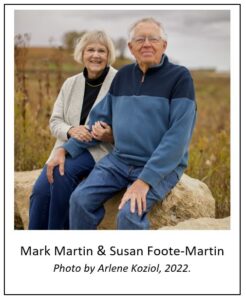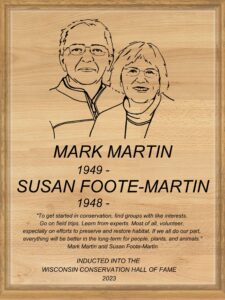1949 –
Inducted 2023
Inducted 2023

MARK MARTIN (1949 – ) &
SUSAN FOOTE-MARTIN (1948 – )
To get started in conservation, find groups with like interests. Go on field trips. Learn from experts. Most of all, volunteer, especially on efforts to preserve and restore habitat. If we all do our part, everything will be better in the long-term for people, plants, and animals.
–Mark Martin and Susan Foote-Martin
Mark Martin and Susan Foote-Martin have dedicated their whole lives to conservation—not just through their respective careers in natural resources, but through five decades of individual volunteer efforts that have had significant impacts on conservation in Wisconsin. Together, centered on their stewardship of Goose Pond, a nature sanctuary operated by the Madison Audubon Society in Columbia County, Mark and Susan have dedicated 90 combined years of service protecting, restoring, and managing mesic prairie habitat—the rarest prairie type of the rarest ecosystem in North America. Probably not since Frederick and Frances Hamerstrom, inducted in 1996, has a couple done so much for wild places and wild things in Wisconsin.
Both grew up having plentiful outdoor experiences in their youth—Mark fishing and hunting with his family, Susan learning to identify birds from an Audubon field guide always left on the kitchen table. Being frequently immersed in nature near their homes, Mark’s vacations to a relative’s cottage and Susan’s family farm fed their growing interests in natural resources. Mark grew up in Marshall and attended the Wisconsin Department of Natural Resources (DNR) Mecan River Youth Conservation Camp in 1966 where he gained hands-on wildlife, fishery, and forestry experience and learned about careers in conservation. He graduated from UW-Stevens Point in 1971 with a degree in wildlife management, then worked for the DNR on wildlife research projects and on prairie restoration to improve wildlife cover. Susan grew up in Brookfield. She graduated from Waukesha Technical College in 1971 with degrees in business and marketing—education later showcased in creating the Great Wisconsin Birding and Nature Trail. Her 30-year DNR career began in 1980 as Education Coordinator at MacKenzie Environmental Education Center in Poynette.
In 1978, Mark met Susan at an International Crane Count meeting. They married in 1979 and moved to Goose Pond Sanctuary in Arlington, where the Madison Audubon Society had recently selected Mark as Resident Manager.
In 1982, Cliff Germain (WCHF Inductee 2014), head of the DNR’s Scientific Areas Program, hired Mark to assist with project establishment and management. Mark coordinated land purchases of over 30,000 acres for State Natural Areas (SNAs). Over his 41 years of public service in the DNR, Mark was very involved with many SNAs including Bailey’s Harbor Boreal Forest and Wetlands, Chiwaukee Prairie, and Spread Eagle Barrens SNAs. He also took the lead on improving public access at Ferry Bluff, helped establish a cordwalk at Kohler Park Dunes and stairway at Roche-A-Cri Mound SNAs. Together with land trust partners, Mark wrote grants generating over $13 million for SNA land protection and management. He was especially adept at working with landowners to acquire/protect private lands, some of which were later donated as SNAs.
to assist with project establishment and management. Mark coordinated land purchases of over 30,000 acres for State Natural Areas (SNAs). Over his 41 years of public service in the DNR, Mark was very involved with many SNAs including Bailey’s Harbor Boreal Forest and Wetlands, Chiwaukee Prairie, and Spread Eagle Barrens SNAs. He also took the lead on improving public access at Ferry Bluff, helped establish a cordwalk at Kohler Park Dunes and stairway at Roche-A-Cri Mound SNAs. Together with land trust partners, Mark wrote grants generating over $13 million for SNA land protection and management. He was especially adept at working with landowners to acquire/protect private lands, some of which were later donated as SNAs.
Following Susan’s work at MacKenzie Environmental Education Center, she worked for DNR’s Bureau of Endangered Resources (BER) where she created the Great Wisconsin Birding and Nature Trail. This award-winning, web-based project features five full-color regional auto booklets that guide people to over 350 nature waypoints across Wisconsin. She also helped to design a new endangered species license plate (a badger) with proceeds returned to the BER.
Susan also helped establish Bird City Wisconsin, an idea that arose from seeing a bird sanctuary signpost in the Village of Elm Grove, a community near where she grew up. She presented the idea to the Wisconsin Bird Conservation Initiative in 2003, and the rest is history as almost 100 communities in Wisconsin now boast this official recognition for meeting certain bird-friendly criteria. Bird City Wisconsin is now modeled across America.
Beginning in 2005, Susan worked with George Meyer (2018 WCHF Inductee) to seek federal funding for deserving state conservation projects. Their efforts resulted in securing $10 million in federal funding for the State Wildlife Grants Program.
Susan is most proud of helping to save Wisconsin’s cave bats from state extirpation. She assisted with their state-listing as “threatened” due to white-nose syndrome.
Until the Martins “retired” from the DNR in 2009 and 2011, they spent their free time turning Goose Pond into one of Wisconsin’s most magical, inspiring, and preserved places. As resident managers of Goose Pond Sanctuary, Mark and Susan coordinate acquisitions and many land management, citizen science, and educational projects. Their friend-raising, fundraising, and grant-writing skills are evidenced by Goose Pond growing from 100 to 730 acres from 1979 to 2022 under their guidance.
Connecting people to nature is their hallmark. Scores of people have gained knowledge and skills and been inspired through collaborative research projects, informational programs, and field days in prairie habitat restoration and management led by the Martins. They have been leading annual field trips for the Wisconsin Natural Resources Foundation since the first one in 1993, continuing to emphasize the value of field experiences to this day. They mentor landowners, some of whom have since donated their lands to Wisconsin as SNAs. Mark and Susan also mentor interns who aspire to have conservation careers. They have written hundreds of articles for the Madison Audubon newsletter, the biweekly Friday Feathered Feature and Goose Pond Updates. Mark also took the Madison Audubon lead on acquiring land at Rose Lake SNA (donated to Jefferson County) and Zeloski Marsh (donated to the DNR).
Mark and Susan’s decades of work with the public have made nature accessible to and appreciated by many who can now enjoy its benefits. The Martins are truly lifetime Wisconsin conservationists.
































